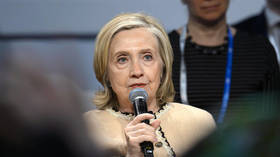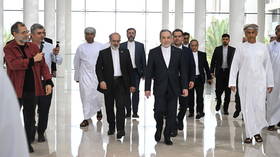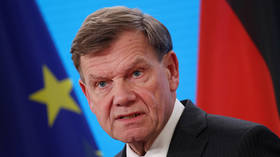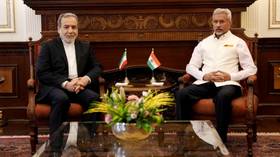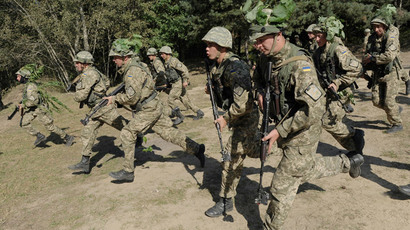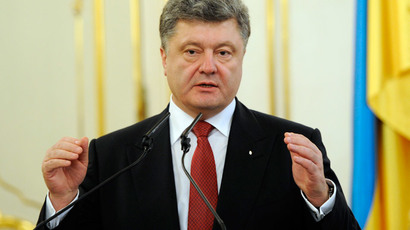Poroshenko aims to change laws to allow foreigners into Ukrainian govt
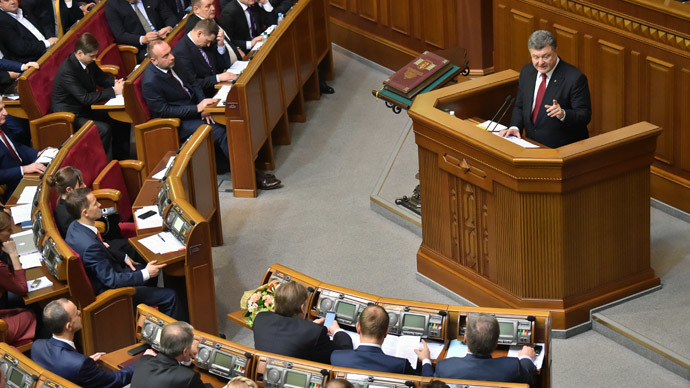
Ukraine’s president has announced plans to change the nation's legislation to make it possible to appoint foreigners to top government positions. This has been dubbed “unprecedented,” and may indicate that the country is being governed “from outside.”
READ MORE: EU chief calls for decentralization and federalization of Ukraine
“My idea is to change the laws in order to give the right to
engage foreigners in state service, including government,”
President Petro Poroshenko said in his address to Parliament on
Thursday. “Or to expand the list of people whom Ukraine’s
president may provide with Ukrainian citizenship in a speedy
procedure,” he added.
He stressed that those foreigners’ willingness to accept
Ukrainian citizenship in order to take the posts will
“confirm” the “strong commitment of our potential
partners and candidates.”
Poroshenko also suggested appointing a foreigner as the head of
the newly-created National Anti-corruption Bureau. He elaborated
that foreigners would have a particular powerful
“advantage,” due to their “absence of links to the
Ukrainian political elite.”
“Nobody will be anybody’s godfather or matchmaker,” he
said, referring to political nepotism.
Earlier, Ukrainian Prime Minister Arseny Yatsenuk suggested the
creation of a new position – deputy prime minister of European
integration affairs. He proposed that a European leader be
appointed to the post.

On Thursday, Yatsenyuk received approval from lawmakers to remain Ukraine's premier, while five Ukrainian parties formed the new ruling European Ukraine coalition during the first session of the new parliament.
‘Does Poroshenko believe all Ukrainians are corrupt?’
If Kiev is truly planning to suggest that top government
positions be filled by citizens of other countries, the situation
is unprecedented, a Ukrainian political expert told RIA Novosti,
also questioning the legitimacy of such a move.
"Such cases are exempt from modern [political] practice, when
someone who does not have the right to even theoretically have
access to state secrets – because he is a citizen of another
country – is invited to take a post of minister in the government
of a sovereign country. I think this is another demonstration of
the degraded status and allegiance to the so-called European
choice,” said Mikhail Pogrebinskiy, head of Kiev's Center of
Political Studies and Conflict Management.
He questioned whether Poroshenko’s plans to appoint a foreigner
as head of the anti-corruption government department suggests a
total lack of confidence in his own people.
The president’s “reasoning is also surprising – does
Poroshenko believe that every citizen of Ukraine will certainly
be corrupt while holding this post?”
Reports cited by RIA Novosti claim that foreigners may be offered
top jobs in the ministries of finance, energy and coal
production, and infrastructure, as well as the post of deputy
prime minister.

Aleksander Kwaśniewski, Poroshenko’s close friend and Poland's president from 1995 to 2005, has reportedly been suggested for an unnamed position, Denis Denisov, the head of the Ukrainian branch of the Institute of CIS, told RIA Novosti.
‘Ukraine not welcome as EU, NATO member’
Many foreign experts – predominantly from the US and Europe – are
already advising Ukraine while working in various government
departments and ministries. Such practice of foreign
administration puts Ukraine under external control, said Denisov.
In his Thursday address to Parliament, Poroshenko said that
Ukraine's neutral out-of-bloc status had proved unjustified and
should be abandoned.
"For this reason we have got back to the idea of integration
with NATO," he added. "We are deepening our cooperation
and the compatibility of our army with NATO's armed forces and
reorienting to NATO standards.”
He stated that implementing the reforms in Ukraine will allow the
country to apply for EU membership in five years. EU membership
was the key demand of those taking part in the Maidan protests,
which led to the armed coup earlier this year.
Despite Poroshenko’s aspirations, EU officials have repeatedly
said that the union is not ready to welcome Ukraine as a member.
On Monday, German Foreign Minister Frank-Walter Steinmeier said
in an interview with Der Spiegel that he does not believe it is
realistic for Ukraine to join the EU in the foreseeable future,
as the economic and political modernization of Ukraine is a
“project for several generations.”

French Foreign Minister Laurent Fabius in an interview to i-Tele
right after Poroshenko’s pro-EU inauguration speech said that the
idea of Ukraine entering the EU doesn’t find support among
“his Western colleagues.”
Nor have NATO members said that they support Ukraine's hope of
joining the alliance. On Monday, Steinmeier said he is against
Ukraine joining NATO, and would only consider supporting the
possibility of a partnership.
On Thursday, Poroshenko also put the issue of Ukraine’s
federalization out of question, saying that "100 percent of
Ukrainians are in favor of a unitary state."
Meanwhile, Ukraine's federalization has been a key demand of
residents in the country's eastern regions of Donetsk and
Lugansk, and was a major point in the September Minsk agreement
between Kiev and eastern authorities.
As Kiev authorities continue to repeatedly reject the idea of
federalization, the president of the European Council, Herman Van
Rompuy, said on Wednesday that Ukraine should indeed undergo
federalization, stressing that this may be a
comprehensive solution to the current crisis.
READ MORE: #Euromaidan 1st birthday: Nothing happens, twice (OP-ED)


